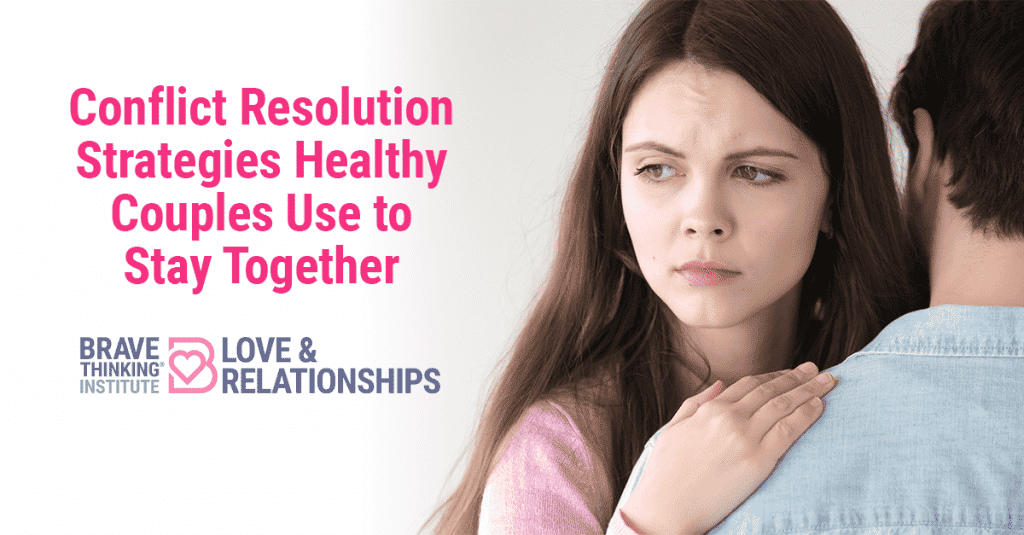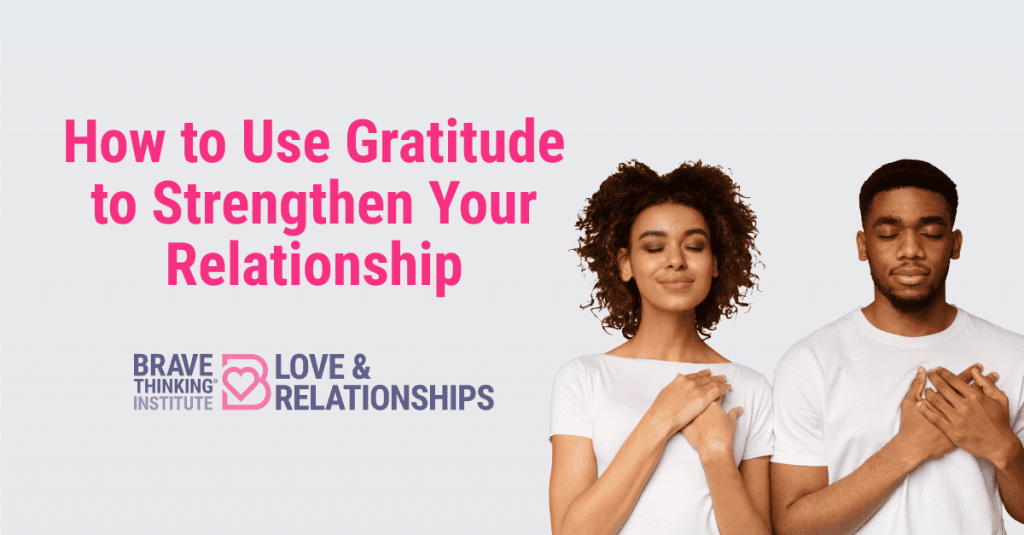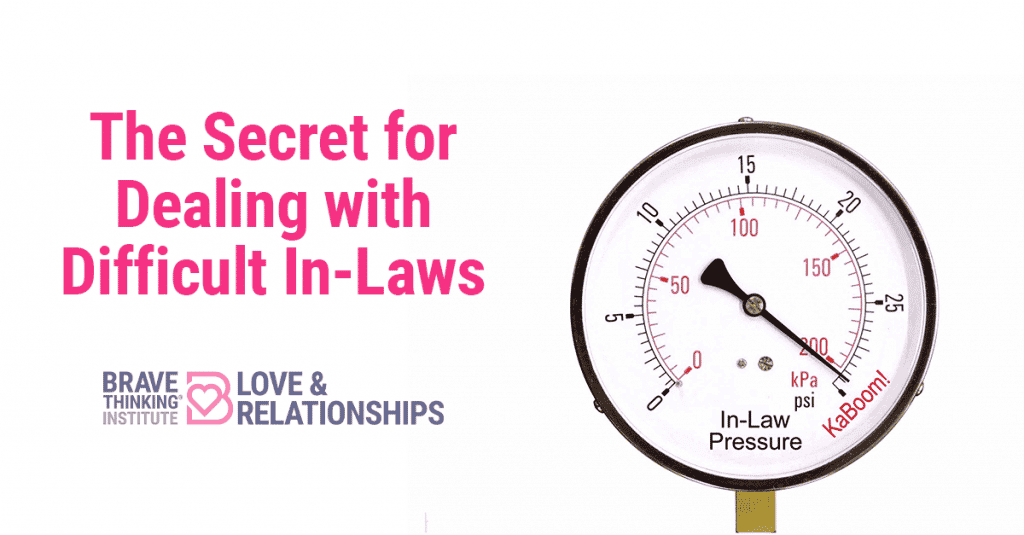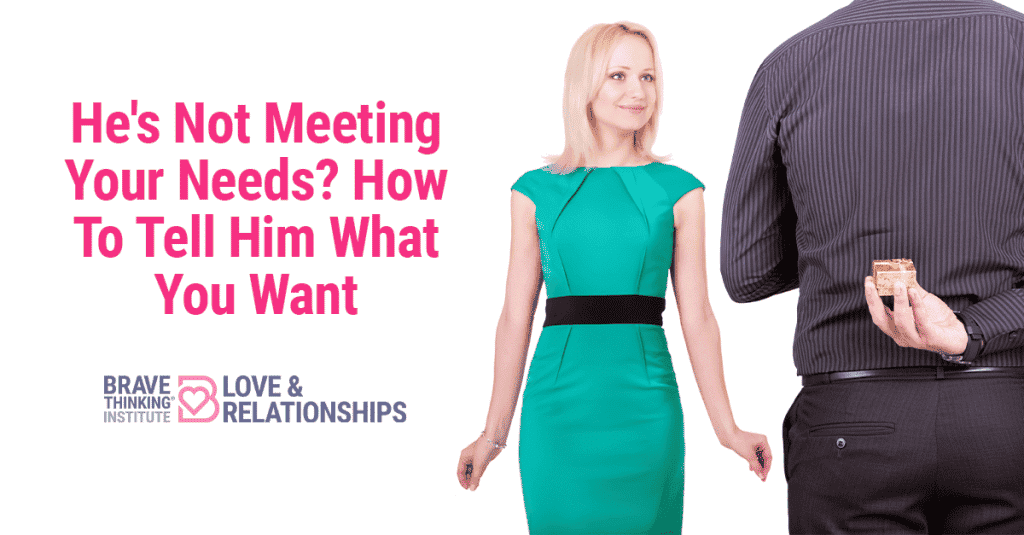In resolving conflicts, you can actually improve your bond going forward
“Conflict is the beginning of consciousness.” – M. Esther Harding
Every relationship is going to have friction. It’s not a matter of whether you’ll have conflict. It’s how you communicate with each other through those issues that determines the quality of the relationship that you have.
Working through your conflicts in a healthy way will actually lead to a closer bond in the relationship. A conflict by itself isn’t a terrible thing. It’s the way you handle it that counts.
We also know that not working through your issues causes them to fester. The resentments grow, and those unresolved feelings can permanently damage your relationship.
If you don’t say anything when something bothers you, it builds up. By the time you do say something, it can be far more damaging and heated than if you just mention the small thing when it becomes an issue.
I’m reminded of a couple I know.
They had a scenario that could have blown up into a terrible, relationship damaging misunderstanding. But they used healthy communication strategies to resolve it. We’ll call them Stacy and Jim.

Jim asked Stacy if she was planning on buying new pajamas. In Stacy’s mind, she immediately went to the worst case scenario. She thought:
“Oh, he doesn’t like what I’m wearing.”
“He doesn’t think I’m sexy.”
“This is the beginning of the end”.
At that moment, Stacy’s imagination had her moving out of their apartment and ending the relationship! Of course, Jim was really just asking a question. He didn’t realize what was in Stacy’s mind when she heard it.
Luckily, Stacy paused before responding. She realized that she might have overreacted to the question, so she moved from conflict to curiosity.
Instead of assuming the worst, she asked Jim what he thought of when he thought about her?
Jim said, “Babe, you’re my babe. You’re sexy and cute and creative.”
Jim went on to list a lot of positive things he thought about Stacy, which made her feel much better.
Then she asked, “Okay, then what would you like instead of my old pajamas?
”When Jim told her the kinds of things he would like, she suggested they go shopping together. Jim also gave her words of affirmation (one of the five love languages) in his response. He told her how beautiful and sexy she was and how much he loved her.
They moved from conflict to solution, by finding something that both Jim and Stacy would enjoy.
Instead of simmering with feelings or not addressing them, Jim and Stacy were able to build a deeper connection.
All of your conflicts won’t be that easy to navigate, of course. Scenarios come up in any relationship that can get heated, or make you emotional. Today, I want to talk about conflict in a deeper way, give you tools to understand reasons why your partner might be picking a fight with you, and offer you three proven strategies to help you resolve conflict in a healthy way.
What Is Conflict Resolution?
Conflicts can stem from small things, or they can be part of very serious differences. Sometimes the triggers in your relationship issues aren’t even intentional. Your partner might do something that upsets or irritates you. If you don’t say anything, they might not be aware that it bothers you at all.
Healthy communication is the best way to address conflict so that it becomes a thing that helps you build your relationship, rather than tearing it down. Because your emotions get heated, it’s not always easy to maintain healthy communication at the moment.
You have to really think about what you say and your tone of voice, so you’re not using one of the four horsemen of conflict communication. One of those unhealthy communication styles is NOT addressing it, or “Stonewalling” (find out more about John Gottman’s Four Horsemen).
What happens when you don’t address those issues?
For most of us, they don’t go away. They stay in our mind until something else happens that bothers us. If we don’t bring them up and address them, each new issue builds on the last one.
A lot of us don’t like conflict. We might think, “This isn’t a big deal. I shouldn’t address this.”
We don’t want to upset the other person, and we don’t want to get into an argument. So we think brushing it under the rug is a better way forward. The truth is, the issues won’t go away if you avoid them. They just get bigger and bigger.
At Brave Thinking® Institute, we advocate shoveling while the piles are small. What this means is that you don’t let small things fester. You take your issue straight to the person to discuss what you think and how you feel, and you give that person an opportunity to respond in a healthy way. This is both a philosophy and a policy in our institute.
Why Should You Resolve a Conflict?
Resolving conflicts, your ability to communicate through differences, can strengthen your relationship. You learn more about your partner and what they want and need. You also get the opportunity to see their perspective on things.
While it might seem simpler to just avoid confrontation and not respond, there’s often a hidden reason when your partner picks a fight with you. Many of us start arguments because there is a deeper fear or feeling that we’re not addressing.
Here are three of the hidden reasons your partner picks a fight with you:
- You’re About to Increase Your Intimacy
- You’re About to Experience a Separation
- Someone Is Craving Attention
1 — You’re About to Increase Your Intimacy
When someone says something that causes conflict, the last thing you would think is that they WANT to be closer to you. But sometimes, that’s exactly what’s going on underneath the surface.
Sometimes those small conflicts are a thing that tests your relationship. They open you up to deeper discussions that make you more vulnerable and improve your bond.
2 — You’re About to Experience a Separation
Have you ever been in a relationship where the other person starts picking fights or behaving badly? Sometimes people do this purposely because they want to end the relationship , but they don’t want to be the “bad guy”. Instead, they pick fights to cause conflict that will end the relationship.
Having the conversation to end a relationship is difficult. No one really wants to hurt another person’s feelings. It takes courage to be honest with someone, and some people are simply not going to be that courageous.
3 — Someone Is Craving Attention
Sometimes, when you start a conflict, you’re really asking the other person to pay attention to you.
If your partner starts an argument or disagreement over something that seems insignificant, it may be their way of asking for your attention. Stop to think about the amount of time you’ve been spending together. You could also think about the quality of time. Have you been sitting on your phone or deep in work instead of paying attention to them?
They may not even realize that the conflict really stems from their need for more attention. But this can often be an underlying reason.
Are You Ready for the Conflict Resolution Strategies for Healthier Communication?
About this point in the post, you might be thinking, “That’s great information, but where are my strategies?”
That’s just what I want to get to.
Once you already have a conflict brewing, you need to know how to communicate in a healthy and respectful way. I’ve broken these tips up into three great strategies for healthy communication that will help you once the conflict starts.
Strategy One: 5 Things to NEVER Say When Fighting… and how to communicate better
You’re going to have disagreements. Every relationship has its share of conflict, but how you communicate is the most important factor in how you move forward from these issues.
The way you talk to your partner can either be productive or toxic. A lot of us have learned to communicate in ways that aren’t always respectful, and we don’t realize it.
A good rule of thumb is to think about how you would feel if the other person said the same thing to you. Of course, we don’t always do that in the heat of the moment. But when we learn the types of things that are unfair to say in a fight, it’s easier to avoid them.
I like to call these the five rules of fighting fair. They are:
- No Name Calling
- No Labeling – When you put a label on a behavior or action.
- No Bringing Up the Past – stacking the bad…to validate our feelings and force blame
- Avoid the Words “Always” and “Never”
- Don’t Hit Below the Belt
1 — No Name-Calling
It’s easy to get heated and say something insulting. But it’s also incredibly damaging to the relationship and trust with your partner. Insults don’t go away just because you apologize for them.
We are all human and we all make mistakes. But I encourage you to try very hard to stay away from language that is derogatory or disrespectful to your partner or anyone else. Many of us have been in environments where name-calling can seem commonplace, but it’s very toxic.
It’s damaging to the other person and your relationship with them.
2 — No Labeling
Labeling is when you put a label on a behavior or action. This is similar to name calling because it’s insulting in some way. In fact, labeling is when you put a “name call” on a behavior or action.
It makes the other person feel judged or attacked. This is when you take an action that your partner has done and paint it as negative in some way.
Some examples of labeling might be:
“You selfishly showed up late.”
“You rudely never called me back.
”The thing with labeling is that it’s judgmental. And what happens when people feel judged? They might get defensive.
In a very real way, we hear labeling as a negative comment about us as a person, rather than hearing that the action is not appreciated.
3 — No Bringing Up the Past
I talked earlier about “shoveling while the piles are small”. Part of the premise of this technique is that you hash out the conflict, name the things that you disagree with, and RESOLVE it.
Once the conversation about this topic is over, it’s important that the issue is settled. If you carry every possible slight or action forward into an argument, it’s not productive. And it’s not fair to the other person.
I’ve heard comedians do bits about this. How their girlfriend/boyfriend went into a fight with a powerpoint full of every minor discrepancy since birth. In reality, it’s not very funny for the person on the receiving end.
As a fighting technique, it’s effective because it makes the other person feel overwhelmed. But it also makes the conflict impossible to resolve. So I encourage you to consider whether you want to “win” the fight or keep the relationship.
4 — Avoid the Words “Always” and “Never”
Any time you use the words “always” and “never” you’re making a generalization. These words are also sure signs that you’re really labeling. Think about the ways that you use these words in an argument:
“You always forget my friends’ events.”
“You never listen when I talk.”
“You always stay late at work.”
In most cases, you use these words when you’re sensationalizing a fault. There might be a few scenarios where the words are not used in a sentence that’s accusatory, but it’s safer to omit them altogether.
5 — Don’t Hit Below the Belt
This is self-explanatory. We all KNOW it’s not kind to do this, but many of us say unfair things in an argument.
When you’re in a relationship, you have a lot of insider information about your partner because they’ve trusted you. Using that information against them in an argument is toxic in the extreme, and it will damage trust.
Some examples of this might be bringing up faults from their past that you know they feel embarrassed about. Or worse, bringing up trauma from their past as an insult or accusation.
What’s a better way to communicate?
My wife and I put a rule in play called, “Can I have a do-over?”
When one of us notices that we’ve done something to upset the other person unintentionally, we pause the conversation. Then we say, “Can I have a do-over?
”This gives us a chance to reason out the scenario while putting ourselves in the other person’s shoes. For instance, my wife had just made plans for us to go spend the day with her family. But I was in the middle of a project that I was way behind on.
When she told me about the plans, I responded, “How long do I have to stay?”
I immediately noticed her face change. Of course, it did. She was excited to spend time with her family, and I made it sound like a chore instead of something we would both enjoy.
I asked for a do-over, and we reasoned out how we could spend a wonderful afternoon with her family, and I could still set time aside for my project.
Strategy Two: How Should You Resolve a Conflict?
I like to call these the three magic words. If you’re thinking “I love you”, you’re kind of right but not literally.
The three magic words are: Tell Me More…
When you say, “tell me more” to your partner, you really are showing them that you love them, but in an active way. Remember, love isn’t just a word or a feeling, it’s an action. The way you show up for your partner, especially in conflict, is how you love them.
After you’ve said, “tell me more”, I encourage you to do two things:
- Practice Reflective Hearing
- Look for Traces of Truth
1 Practice Reflective Hearing
Once you’ve asked your partner to tell you more, I encourage you to practice reflective hearing. This means that you listen to what they say and then repeat it back in your own words.
This is one of the techniques used in couples therapy, and it works well. This makes you pause and reason through exactly what the other person is saying.
When you rephrase it in your own words, it helps you to put yourself into your partner’s shoes. It also validates your partner because they truly know that you hear and understand what they are saying.
2 Look for Traces of Truth
So many times we only listen to respond. This is especially true in an argument. We’re waiting for our opportunity to speak and only listening for points we can disagree with.
When you look for traces of truth, you’re actively reasoning through your partner’s perspective to analyze if it rings true. Does this make sense? Can you see why they believe this? Can you understand their point of view?
You may find that you agree more with what they are saying than you originally believed.
Strategy Three: 4 Steps to a Great Apology
We’ve all had conflicts. More than that, we’re all human. Which means we’ve all said and done things that we should apologize for at certain points.
In a healthy relationship, being able to say that you’re sorry is important. Giving and receiving grace and understanding will help you build stronger bonds. No one is perfect, but we can all choose to grow and improve in the way that we communicate.
You might think that an apology is simply a matter of saying “I’m sorry”. That is part of apologizing, and sometimes your partner will accept just that. But a truly great apology has a few pieces.
The four steps to a great apology:
- This is what happened and I take responsibility.
- This is what I’m doing to fix it.
- This is the system I put in place to make sure it doesn’t happen again.
- What else can I do to make it right? What else can I do to fix this for you?
Do you see the difference between these steps and a simple apology? Here, you’re not only taking ownership of the situation, but you’re working to rectify it.
This also gives the other person a chance to say what they would like in order to move forward.
Learning to Love Yourself and Your Partner Through Conflict Resolution
Conflicts happen in every type of relationship. If you learn to communicate in a productive and respectful way, you can turn conflict into an opportunity to deepen your bond and emotional intimacy.
In today’s post, you’ve learned some hidden reasons your partner might pick a fight with you. We’ve discussed healthy communication and some hot-button things you should never say in an argument. You’ve also learned three great strategies to resolve conflict in a healthy way.
In order to maintain a healthy communication style with others, you must start with the way that you talk to yourself. One of the ways I encourage my students to get into a habit of better self-talk is by using affirmations that will absolutely help them improve their confidence and raise their vibration.
As my gift to you, download your free Self-Love Activation Kit.
The amount of love you give yourself is directly proportional to the love you attract. As you build your own reservoir of love, you’ll also find it easier to project that love outward in healthier communication and overall joy.




Leave a Reply